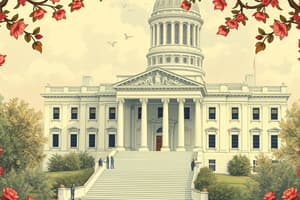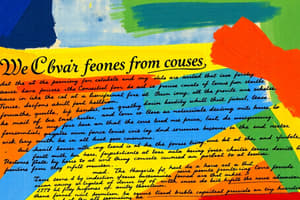Podcast
Questions and Answers
What idea did Rousseau introduce that significantly influenced the US government?
What idea did Rousseau introduce that significantly influenced the US government?
- Judicial review
- Checks and balances
- The separation of powers
- Popular sovereignty (correct)
What significant role did James Madison play in shaping the US Constitution?
What significant role did James Madison play in shaping the US Constitution?
- He led the Continental Army
- He served as the first Chief Justice
- He created the Virginia Plan (correct)
- He wrote the Declaration of Independence
What was the primary purpose of the Declaration of Independence?
What was the primary purpose of the Declaration of Independence?
- To establish a new government structure
- To support the Articles of Confederation
- To declare separation from Great Britain (correct)
- To outline the Bill of Rights
How did Common Sense by Thomas Paine influence American attitudes toward independence?
How did Common Sense by Thomas Paine influence American attitudes toward independence?
Why were the Articles of Confederation designed to have a weak central government?
Why were the Articles of Confederation designed to have a weak central government?
Which branch of government has the power to veto laws?
Which branch of government has the power to veto laws?
What is a key benefit of the federal system of government in the United States?
What is a key benefit of the federal system of government in the United States?
What is one notable drawback of the US federal system of government?
What is one notable drawback of the US federal system of government?
What principle ensures that government officials are held accountable under the law?
What principle ensures that government officials are held accountable under the law?
Which amendment guarantees the right to a fair trial?
Which amendment guarantees the right to a fair trial?
What was the primary reason for opposition to the ratification of the US Constitution?
What was the primary reason for opposition to the ratification of the US Constitution?
Which type of speech is NOT protected under the First Amendment?
Which type of speech is NOT protected under the First Amendment?
Who is recognized for developing the ideas of Limited Government and Social Contract Theory?
Who is recognized for developing the ideas of Limited Government and Social Contract Theory?
Which amendment protects individuals from being tried twice for the same crime?
Which amendment protects individuals from being tried twice for the same crime?
What does the term 'prior restraint' refer to in the context of free speech?
What does the term 'prior restraint' refer to in the context of free speech?
Which document did Thomas Paine write that encouraged independence from Britain?
Which document did Thomas Paine write that encouraged independence from Britain?
What is the concept of 'judicial review' primarily concerned with?
What is the concept of 'judicial review' primarily concerned with?
What percentage of states must approve an amendment for it to be ratified?
What percentage of states must approve an amendment for it to be ratified?
Which of the following best describes 'civil rights'?
Which of the following best describes 'civil rights'?
Which level of government is primarily responsible for overseeing the amendment process of the US Constitution?
Which level of government is primarily responsible for overseeing the amendment process of the US Constitution?
What does 'double jeopardy' prevent?
What does 'double jeopardy' prevent?
What is an 'unfunded mandate'?
What is an 'unfunded mandate'?
When there is a conflict between state law and federal law, what is the outcome?
When there is a conflict between state law and federal law, what is the outcome?
Which term refers to the application of the Bill of Rights to the states?
Which term refers to the application of the Bill of Rights to the states?
Which types of powers are defined as those specifically assigned to the federal government?
Which types of powers are defined as those specifically assigned to the federal government?
What principle ensures that no government branch has total power?
What principle ensures that no government branch has total power?
Who has the greatest impact on interpreting the Bill of Rights in the US government?
Who has the greatest impact on interpreting the Bill of Rights in the US government?
Which concept implies that everyone must adhere to established laws without exception?
Which concept implies that everyone must adhere to established laws without exception?
What does the term 'individual rights' refer to in the context of government?
What does the term 'individual rights' refer to in the context of government?
Flashcards
Popular Sovereignty in US Gov't
Popular Sovereignty in US Gov't
The idea that the people hold the ultimate power in government, expressed through elections that select representatives.
US Constitution's Preamble Purpose
US Constitution's Preamble Purpose
Outlines the goals and reasons behind establishing the US Constitution.
Limited Speech by 1st Amendment
Limited Speech by 1st Amendment
The First Amendment restricts certain types of speech, including libel, slander, and speech that is dangerous or harmful.
Amendments protecting legal rights
Amendments protecting legal rights
Signup and view all the flashcards
5th Amendment Rights
5th Amendment Rights
Signup and view all the flashcards
6th Amendment Right
6th Amendment Right
Signup and view all the flashcards
8th Amendment Protections
8th Amendment Protections
Signup and view all the flashcards
Prior Restraint
Prior Restraint
Signup and view all the flashcards
Federalism
Federalism
Signup and view all the flashcards
Judicial Review
Judicial Review
Signup and view all the flashcards
Civil Liberties vs. Civil Rights
Civil Liberties vs. Civil Rights
Signup and view all the flashcards
Incorporation
Incorporation
Signup and view all the flashcards
Expressed vs. Implied Powers
Expressed vs. Implied Powers
Signup and view all the flashcards
Amendment Process
Amendment Process
Signup and view all the flashcards
Federal Law Supremacy
Federal Law Supremacy
Signup and view all the flashcards
Levels in Amendment Process
Levels in Amendment Process
Signup and view all the flashcards
Delegated Powers
Delegated Powers
Signup and view all the flashcards
Reserved Powers
Reserved Powers
Signup and view all the flashcards
Concurrent Powers
Concurrent Powers
Signup and view all the flashcards
Supreme Court's Role in Bill of Rights
Supreme Court's Role in Bill of Rights
Signup and view all the flashcards
Representative Government
Representative Government
Signup and view all the flashcards
Popular Sovereignty
Popular Sovereignty
Signup and view all the flashcards
Social Contract Theory
Social Contract Theory
Signup and view all the flashcards
Declaration of Independence
Declaration of Independence
Signup and view all the flashcards
Articles of Confederation
Articles of Confederation
Signup and view all the flashcards
Three Branches of Government
Three Branches of Government
Signup and view all the flashcards
Checks and Balances
Checks and Balances
Signup and view all the flashcards
Federal System of Government
Federal System of Government
Signup and view all the flashcards
Study Notes
Unit 2: Foundations of American Government
- Outcomes: Complete the review to prepare for the summative test and submit it to Canvas before testing.
Fundamental Principles in Government
- US Constitution Principles: Popular Sovereignty, Rule of Law, Separation of Powers/Checks and Balances, Federalism, Independent Judiciary, and Individual Rights.
- Popular Sovereignty: The people elect leaders to represent them. This system works because the people have a say in their representation through elections.
- Preamble of the Constitution: Establishes the purpose of the Constitution.
- Limited Speech: The First Amendment limits speech to prevent libel, slander, and potentially harmful speech.
- Legal System Rights: Amendments 5, 6, 7, and 8 protect individual rights within the legal system.
- 5th Amendment: Guarantees rights of the accused including indictments, due process, self-incrimination, double jeopardy, and rules for eminent domain.
- 6th Amendment: Enshrines the right to a fair trial.
- 8th Amendment: Protections against excessive bail and cruel or unusual punishment.
- Prior Restraint: The government trying to prevent potentially harmful information from becoming public (e.g., damaging reputations by exposing corruption).
Impact of Compromise in Government
- Greatest Barrier to Ratification: The lack of a Bill of Rights was the greatest barrier to the ratification of the US Constitution in 1787.
Important Historical People in US Government
- John Locke: English Enlightenment thinker who contributed ideas of Limited Government and Social Contract Theory to US government.
Significant Documents in US Government
- Declaration of Independence: Declared the colonies' separation from Great Britain and independence as a new country, protecting unalienable rights.
- Common Sense: A 1776 pamphlet by Thomas Paine that influenced Americans to fight for independence and supported democracy.
US Government Power Centers
- Articles of Confederation Shortcoming: The Articles of Confederation lacked a strong central government due to fear of a monarchy, giving power to the states.
- Branches of Government: The three branches of government are Legislative, Executive, and Judicial.
- Checks and Balances: Each branch has powers that limit the power of the other branches. (e.g., Legislative approves presidential appointments; Judicial interprets laws' constitutionality; Executive vetoes laws)
US Government Structures and Functions
- Organization: The government is organized into three branches: Legislative, Executive, and Judicial.
- Federal System: A system where power is divided between national and state governments.
- Federal System Benefits: Divided power, citizen participation, and flexibility.
Roles, Powers, and Limits in Government
- Amendment Process: Amendments are proposed by a majority vote in Congress and then ratified by three-fourths of states.
- Conflict Between Laws: Federal law prevails over conflicting state law. The Supreme Court decides if there is such a conflict.
- Types of Powers: Delegated powers (federal), Reserved powers (states), and Concurrent powers (both federal and states).
Expansion and Restrictions of Rights in the US
- Impact of the Supreme Court: The Supreme Court interprets the Constitution and has significantly impacted how the Bill of Rights is understood.
- Academic Vocabulary: Key terms like representative government, rule of law, limited government, individual rights, separation of powers, popular sovereignty, constitutionalism, majority rule, due process, and republican government are important to understand.
Checks and Balances
- System of Checks and Balances: This system ensures that no single branch becomes too powerful and limits the power of each branch through powers assigned to each other.
- Federalism: Division of powers between federal and regional governments.
- Independent Judiciary: Separate from other branches of government.
- Strict vs. Loose Construction: Different approaches to interpreting the Constitution. Strict construction (literal interpretation) vs. loose construction (flexible interpretation).
- Judicial Review: The power of the courts to review laws for constitutionality.
- Civil Liberties and Rights: Constitution-guaranteed individual freedoms and protections.
- Incorporation: Extending Bill of Rights protections to the states (civil liberties).
- Prior Restraint: Preventing potentially harmful information from reaching the public (e.g., reputational harm from corruption).
- Power Limitations: Express, Interstate Commerce, Intrastate Commerce, Unfunded Mandates, and Devolution.
Studying That Suits You
Use AI to generate personalized quizzes and flashcards to suit your learning preferences.




